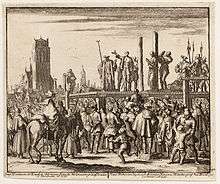Jan Woutersz van Cuyck

Jan Woutersz van Cuyck (or Kuik) (ca.1540-1572) was a Dutch Renaissance painter from Dordrecht. He became famous as a Mennonite martyr of the Protestant Reformation who was executed in 1572. His heart-wrenching letters from prison were published in the Martyrs Mirror.
Biography
According to Houbraken he was imprisoned for his Mennonite beliefs. During his short imprisonment, he was persuaded to paint the local sheriff in the role of Solomon in an allegorical painting for the vierschaar in the city hall of Dordrecht. This painting and the story of its creation was a Dordrecht public attraction in 1712, when Houbraken was writing.[1] Though he was the painter of the piece, this story was proved wrong a century later when archival evidence showed that the painting had already been paid for two decades earlier in 1552. It remains highly ironic however, to think that he was tried for religious crimes in the same room for which he created the main decoration.
Cuyck was burned together with another Mennonite martyr, Adriaentgen Jans van Molenaarsgraaf.[1] He left a wife, a daughter of 7 years, and "a great rumour".[1] His story and letters he wrote in prison were published in the Martyrs Mirror, also known as 't Bloedig Tooneel der Doopsgezinden, by Tieleman Jansz van Bracht. Houbraken quoted both Mathias Balen's Beschryvinge van Dordrecht[2] and the Martyrs Mirror, pag. 590. and p. 628.[1]
Paintings
His paintings have been lost for the most part, but Salomon's judgement still remains in Dordrecht.
References
- 1 2 3 4 (Dutch) Jan van Kuik Woutersze biography in De groote schouburgh der Nederlantsche konstschilders en schilderessen (1718) by Arnold Houbraken, courtesy of the Digital library for Dutch literature
- ↑ Beschryvinge der stad Dordrecht in Google Books, p. 841
| Wikimedia Commons has media related to Jan Woutersz. van Cuyck. |
